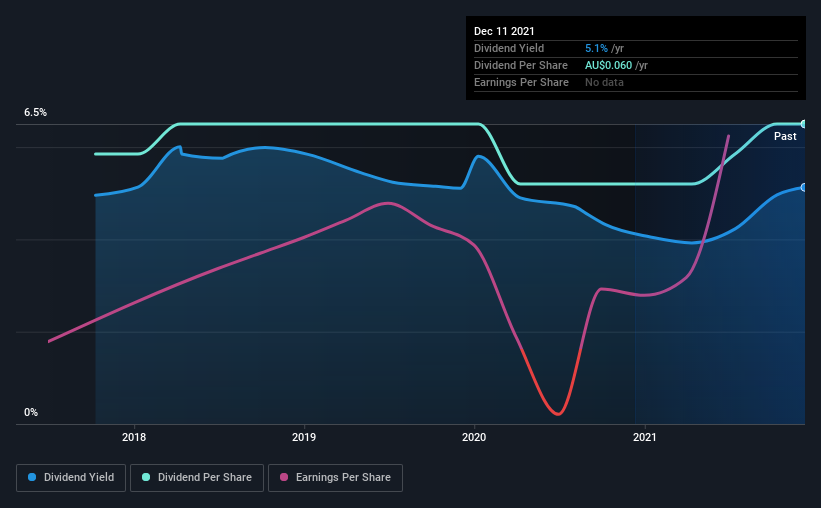Plato Income Maximiser Limited (ASX:PL8) Passed Our Checks, And It's About To Pay A AU$0.005 Dividend
It looks like Plato Income Maximiser Limited (ASX:PL8) is about to go ex-dividend in the next 4 days. The ex-dividend date is usually set to be one business day before the record date which is the cut-off date on which you must be present on the company's books as a shareholder in order to receive the dividend. It is important to be aware of the ex-dividend date because any trade on the stock needs to have been settled on or before the record date. Accordingly, Plato Income Maximiser investors that purchase the stock on or after the 16th of December will not receive the dividend, which will be paid on the 31st of December.
The company's next dividend payment will be AU$0.005 per share, on the back of last year when the company paid a total of AU$0.054 to shareholders. Based on the last year's worth of payments, Plato Income Maximiser stock has a trailing yield of around 5.1% on the current share price of A$1.17. If you buy this business for its dividend, you should have an idea of whether Plato Income Maximiser's dividend is reliable and sustainable. We need to see whether the dividend is covered by earnings and if it's growing.
Check out our latest analysis for Plato Income Maximiser
Dividends are typically paid out of company income, so if a company pays out more than it earned, its dividend is usually at a higher risk of being cut. That's why it's good to see Plato Income Maximiser paying out a modest 28% of its earnings.
When a company paid out less in dividends than it earned in profit, this generally suggests its dividend is affordable. The lower the % of its profit that it pays out, the greater the margin of safety for the dividend if the business enters a downturn.
Click here to see how much of its profit Plato Income Maximiser paid out over the last 12 months.
Have Earnings And Dividends Been Growing?
Businesses with strong growth prospects usually make the best dividend payers, because it's easier to grow dividends when earnings per share are improving. Investors love dividends, so if earnings fall and the dividend is reduced, expect a stock to be sold off heavily at the same time. That's why it's comforting to see Plato Income Maximiser's earnings have been skyrocketing, up 87% per annum for the past five years.
Many investors will assess a company's dividend performance by evaluating how much the dividend payments have changed over time. In the past four years, Plato Income Maximiser has increased its dividend at approximately 2.7% a year on average. It's good to see both earnings and the dividend have improved - although the former has been rising much quicker than the latter, possibly due to the company reinvesting more of its profits in growth.
The Bottom Line
Has Plato Income Maximiser got what it takes to maintain its dividend payments? Companies like Plato Income Maximiser that are growing rapidly and paying out a low fraction of earnings, are usually reinvesting heavily in their business. This is one of the most attractive investment combinations under this analysis, as it can create substantial value for investors over the long run. Overall, Plato Income Maximiser looks like a promising dividend stock in this analysis, and we think it would be worth investigating further.
With that in mind, a critical part of thorough stock research is being aware of any risks that stock currently faces. To help with this, we've discovered 3 warning signs for Plato Income Maximiser (1 is concerning!) that you ought to be aware of before buying the shares.
If you're in the market for dividend stocks, we recommend checking our list of top dividend stocks with a greater than 2% yield and an upcoming dividend.
Have feedback on this article? Concerned about the content? Get in touch with us directly. Alternatively, email editorial-team (at) simplywallst.com.
This article by Simply Wall St is general in nature. We provide commentary based on historical data and analyst forecasts only using an unbiased methodology and our articles are not intended to be financial advice. It does not constitute a recommendation to buy or sell any stock, and does not take account of your objectives, or your financial situation. We aim to bring you long-term focused analysis driven by fundamental data. Note that our analysis may not factor in the latest price-sensitive company announcements or qualitative material. Simply Wall St has no position in any stocks mentioned.

